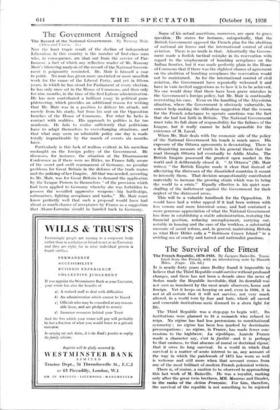The Government Arraigned
NOT the least tragic result of the decline of independent Liberalism in this country is the liuMber of first-class men who, in consequence, are 'shut out irom the service of Par- liament, a fact of which any reflective reader of Mr. Ramsay Muir's blistering analysis of the record of the National Govern- ment is poignantly reminded. Mr. Muir Is himself a case in point. No man has given more unstinted or more unselfish work for the cause of the Liberal Party, and yet in fifteen years, in which he has stood for Parliament at every election, he has only once sat in the House of Commons, and then only for nine months, in the time of the first Labour administration. :Ile has now contributed a brilliant essay in political pam- phleteering, which provides an additional reason for wishing that Mr. Muir was in a position to deliver his attack, not merely from his study, but from his seat on the Opposition benches of the House of Commons. For what he Inas is contact with realities. His approach to politics is far too academic. He fails to realise sufficiently that politicians have to adapt themselves to ever-changing situations, and that what may seem an admirable policy one day is made totally impracticable by the march of events six months later.
Particularly is this lack of realism evident in his merciless onslaught on the foreign policy of the Government. He discusses, for instance, the situation at the Disarmament Conference as if there were no Hitler, no France fully aware of the secret and swift .rearmament. of Germany, no peculiar problems for Great Britain in the defence of the trade rout.. and the policing of her Empire. All that was needed; according to Mr. Muir, was for Great Britain to demand the application by the'League Powers to themielfes "Of the provision which had been applied to Germany whereby she was forbidden to possess the so-called aggressive weapons:---big --battleships, submarines, fighting aeroplanes and tanks." Mr. Muir must know perfectly well that such a proposal would have had about as much chance of acceptance by France as a suggestion that .Alsace-Lorraine Should be 'handed back to Gerniany.
:Same of--his actual assertions, moreover, are open to grave question. - He states for instance, categorically, that the British Government opposed the French plan for the abolition of national air forces and the international control of civil aviation. There is no truth in that. Admittedly the Govern- ., — ment made a foolish tactical mistake in its reservation with regard to the employment of bombing aeroplanes on the Indian frontier, but it was made perfectly plain in the House of commons that if there was the slightest chance of agreement on the abolition of bombing aeroplanes the reservation would not be maintained. As for the international control of civil aviation, the Government have repeatedly welcomed it and have in fain invited suggestions as to how it is to be achieved. No one would deny that there have been grave mistakes in the Government's foreign policy, but Mr. Muir is continually overstating his case. Even on the handling of the Abyssinian situation, where the Government is obviously vulnerable, he cannot help making the ridiculous suggestion that the reason for the French reluctance to operate sanctions was the fact that she had lost faith in Britain. The National Government must take its full share of responsibility for the failures of the League, but it really cannot be held responsible for the existence of M. Laval.
When Mr. Muir deals with the economic side of the policy of the National Government his touch is much surer. His exposure of the Ottawa agreements is devastating. There is a disquieting measure of truth in his general thesis that the road through Ottawa led eventually to Addis Ababa. The British Empire possessed the greatest open market in the world and it deliberately closed it. •" At Ottawa" (Mr. Muir writes) "the British Empire made it clear that instead of alleviating the distresses of the dissatisfied countries it meant to intensify them. That decision unquestionably contributed materially to increase the growing strain which was to bring the world to a crisis." Equally effective is his quiet mar- shalling of the indictment against the Government for their neglect of the distressed areas.
This will be a valuable handbook for the Opposition. It would have had a wider appeal if- it had been written with less venom and more historical sense, and had contained a more generous appreciation of what the National Government has done in establishing a stable administration, restoring the financial position, reducing unemployment, carrying out, notably in housing and the care Of the workless, a substantial measure of social reform, and, in general, maintaining Britain as what Herr Hitler _calls a "Robinson Crusoe Island" in a swirling sea of cruelty and hatred and nationalist passions. .




















































 Previous page
Previous page